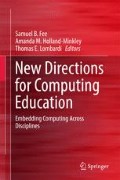Abstract
All too often, discussions of computer science education are constrained by notions unequal to the task of advancing education—notions such as “skill acquisition” or “national competitiveness”. We are told by many scholars, businesspeople, and policy-makers that computer science is necessary for students because “the workplace demands 21st-century skills”, or “many jobs will be opening up in technical areas”. These sentiments are simply too trite to motivate clear thinking about computer science education—and for that matter, they are too trite to motivate the students themselves. A more fertile foundation for discussion is to think of education as a process through which students create an intellectual autobiography—a narrative that supplies them with such things as lifelong projects and abiding interests. In approaching computer science education from this angle, it is especially helpful to begin with the many strengths and occasional weaknesses of the resurgent “maker movement” in American youth culture. By thinking of computer science as a discipline of construction and expressive creation, we can achieve a fresh perspective on increasingly stale issues such as “computational thinking”, “assessment of skills”, and “core curricula”.
Access this chapter
Tax calculation will be finalised at checkout
Purchases are for personal use only
References
Anderson, C. (2012). Makers. New York: Crown Publishing.
Buechley, L., & Mako Hill, B. (2010). LilyPad in the wild: How hardware’s long tail is supporting new engineering and design communities. In Proceedings of Designing Interactive Systems [DIS 2010] (pp. 199–207).
Carey, K. (2015). The end of college. New York: Riverhead Books.
Crawford, M. (2009). Shop class as soulcraft. New York: Penguin Books.
de Tocqueville, A. (1840/1990). Democracy in America (Vol. 2). New York: Vintage edition.
Frauenfelder, M. (2010). Made by hand. New York: Penguin Books.
Gatto, J. T. (2005). Dumbing us down. Gabriola Island, BC, Canada: New Society Publishers.
Kamenetz, A. (2015). The test. New York: PublicAffairs.
Lemann, N. (1999). The big test. New York: Farrar, Straus, and Giroux.
Pursell, C. (2015). From playgrounds to playstations. Baltimore, MD: Johns Hopkins University Press.
Zagalsky, A., Feliciano, J., Storey, M., Zhao, Y., & Wang, W. (2015). The emergence of GitHub as a collaborative platform for education. In Proceedings of the 18th ACM Conference on Computer Supported Cooperative Work and Social Computing (pp. 1906–1917).
Acknowledgements
This chapter is a substantial extension of a paper first written for the Future Directions in Computing Education Summit, held in Orlando, Florida (January 2014) and sponsored by the National Science Foundation (NSF). The NSF has also supported the work on which this essay is based under grants DRL1114388, IIS1231645, EAGER IIS0856003, and CNS0940484; thanks additionally to SparkFun Inc. for their generous fellowship support. Conversations with Gerhard Fischer, Clayton Lewis, Roy Pea, Nathan Seidle, Diane Sieber, and Scot Douglass have been especially helpful. Thanks also to members of the Craft Technology Lab past and present: Ann Eisenberg, Ben Leduc-Mills, Swamy Ananthanarayan, HyunJoo Oh, Jeeeun Kim, Leah Buechley, Nwanua Elumeze, Yingdan Huang, Glenn Blauvelt, and Sue Hendrix.
Author information
Authors and Affiliations
Corresponding author
Editor information
Editors and Affiliations
Rights and permissions
Copyright information
© 2017 Springer International Publishing AG
About this chapter
Cite this chapter
Eisenberg, M. (2017). Approaching Computer Science Education Through Making. In: Fee, S., Holland-Minkley, A., Lombardi, T. (eds) New Directions for Computing Education. Springer, Cham. https://doi.org/10.1007/978-3-319-54226-3_3
Download citation
DOI: https://doi.org/10.1007/978-3-319-54226-3_3
Published:
Publisher Name: Springer, Cham
Print ISBN: 978-3-319-54225-6
Online ISBN: 978-3-319-54226-3
eBook Packages: EducationEducation (R0)

